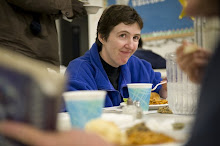I'm starting Lent early.
Jesus, full of the Holy Spirit, returned from the Jordan and was led by the Spirit in the wilderness, where for forty days he was tempted by the devil. He ate nothing at all during those days, and when they were over, he was famished. The devil said to him, “If you are the Son of God, command this stone to become a loaf of bread.” Jesus answered him, “It is written, ‘One does not live by bread alone.’”
Then the devil led him up and showed him in an instant all the kingdoms of the world. And the devil said to him, “To you I will give their glory and all this authority; for it has been given over to me, and I give it to anyone I please. If you, then, will worship me, it will all be yours.” Jesus answered him, “It is written, ‘Worship the Lord your God, and serve only him.’”
Then the devil took him to Jerusalem, and placed him on the pinnacle of the temple, saying to him, “If you are the Son of God, throw yourself down from here, for it is written, ‘He will command his angels concerning you, to protect you’, and, ‘On their hands they will bear you up, so that you will not dash your foot against a stone.’”
Jesus answered him, “It is said, ‘Do not put the Lord your God to the test.’” When the devil had finished every test, he departed from him until an opportune time.
--Luke 4:1-13
All kinds of things are waking up, vocationally. I’m doing work I love, with the cathedral and the homeless community. The call has gotten louder: all I want to do is go be a priest to them. I haven’t been here long enough to start a formal process, but the feedback I’m getting is completely positive, and my clergy supports me. We’re talking about things that I’m incredibly excited about, both for right now and in the future.
And I’m going internally bananas. For over a year, no one told me I spoke too fast. I couldn’t; I was either on interferon or healing from it. I was exhausted all the time. But I was talking to one of my priests the other night, and I caught myself stuttering. Then I went to the Catechumenate after dinner. I organize Thursday night dinners (we feed homeless people as well as parishioners), so I stayed late to help clean up. I walked in, in the middle of lectio. The passage was the above quotation, for the first Sunday in Lent. The leader asked what God was telling us through this story. My answer couldn’t have been clearer:
Keep calm, stay grounded, pray, breathe, keep at it.
And so that’s what I’m going to do.
I suck at meditation. I’ve never understood the point of counting my breaths. And I’m no better at centering prayer. Attempting to hold one word or image just opens me up to associations. My brain lunges against every restraint, exactly because I’m trying to hold it still.
I can, however, breathe. And if I’m not legalistic about it—if I don’t label it something and then try to live up to that—I’ll feel free enough to let myself flow into it.
I love everything I’m doing—but I need to find my center. A friend taught me a visualization, years ago. Someone taught it to her, when she was learning to sing:
Imagine yourself as a tree. Stand, preferably barefoot on the earth (but in shoes on the floor, if you need to). Breathe up from your feet, through your legs, into your diaphragm, out. Draw water up from the earth, into your roots, through your body, out into the atmosphere and let go of it; let it fall again as rain. Keep breathing, until you are where you need to be.
I didn’t do it when I was sick; I didn’t have the balance to stand still alone. Now, just writing it out makes me breathe deeply, gives me space, gives me life.
Giving up chocolate is missing the point. Lent isn’t a punishment; it’s an invitation to remember who we are. I’ve kept prayer journals in previous seasons; more or less faithfully. Last year I tried to be mindful of the moment, to pay attention in conversations and not wander everywhere. I saw how distractible I was (and am); I’m not sure I learned how to solve it. What I need is to say to God with my breath, my intention, my body,
I exist, because of you. I am yours. Do with me, what you will.
What needs to happen, in me and for the world, can only happen in that place. And I can’t even imagine what will sprout there.
I’ve struggled with talking fast for... practically ever. But right now, I’m thankful that I have this physical cue. And I have experience when it wasn’t an issue. I remember centeredness. I know what it is to be grounded. I don’t need the fatigue that went with that. I can find the calm that will keep me in control of my body. I can trust God to hold the light where I am going.




